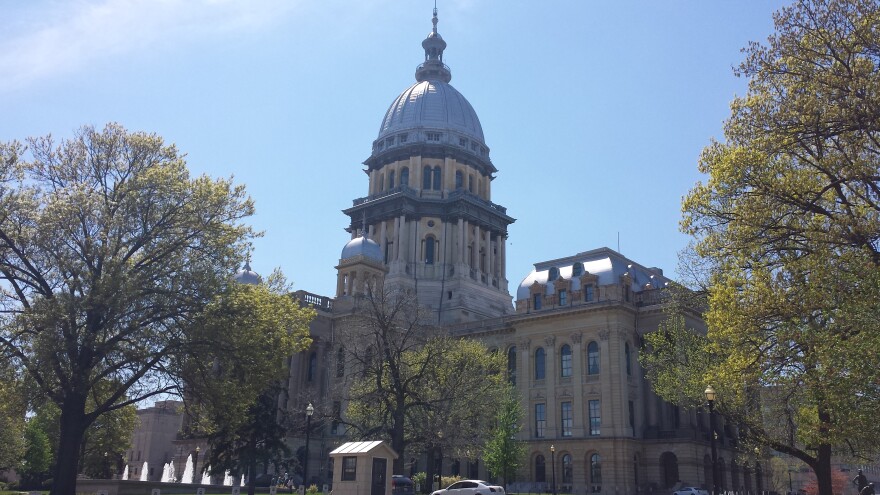The legislative session in Springfield was extended as legislators try to reconcile the cost of health benefits for qualifying residents regardless of immigration status. Democrats hold a supermajority in the statehouse, so there's been no incentive to extend a seat for Republicans in budget talks. That’s been the experience for Republican Deputy Senate Leader Sue Rezin.
With the most recent legislative map redistricting, her constituency now includes part of DeKalb County, including the City of DeKalb.
“Welcome to creative drawing," said Rezin about her 38th District senate seat. “And just so you know, both parties are guilty of it.”
A big holdup in budget negotiations is the cost of a Medicaid expansion program that offers health insurance to residents aged 42 and up who meet the poverty guidelines -- regardless of immigration status. Medicaid was first expanded to all adults in Illinois aged 64 and up, regardless of status, in 2020. It was extended to all those aged 42 and up last year. Participants would still not be eligible for long term residential care.
The Pritzker Administration now estimates the program will cost over one billion dollars for the next fiscal year. WNIJ previously reported that consultants providing the estimates acknowledge substantial uncertainty in the numbers.
“Regardless of what side of the issue you are on regarding the bill that was passed in 2020,” Rezin said, “we as legislators have to figure out, how are we going to pass a balanced budget?”
Proposals by the administration to offset the costs include charging copays and changing reimbursement rates. Legislators are also debating a proposal to expand the program to adults 19 years old and up.
The Latino Legislative Caucus is a proponent of expanding coverage. According to the U.S. Department of Health and Human Services, Latinos have the highest uninsured rated of any racial/ethnic group in the U.S. Nationally, Latinos died at the second highest rate of COVID, behind Native Americans, according to the Centers for Disease Control and Prevention.
Advocates argue the COVID pandemic illustrates the need for healthcare coverage, especially for poor noncitizens whose employers do not offer insurance.
Illinois is not the only state that has extended health coverage to all of its residents. California expanded its Medicaid program Med-Cal to residents younger than 26 regardless of immigration status in 2020 and expanded it to adults 50 and older in 2022.
Unlike traditional Medicaid, the federal government doesn’t reimburse the state fully for medical coverage of undocumented residents.
Rezin also has concerns about how migrants arriving in the state may impact the Medicaid program. A recent news release from her office is titled, “End of Title 42 Highlights IL Spending on Undocumented Healthcare.”
Title 42 allowed for Border Patrol to turn away people seeking asylum in the U.S. during the COVID health emergency. That ended on May 11.
“Once title 42 has ended,” she said, “they're going to see many people coming to Illinois.”
And they're concerned,” she continued, “with the cost to everyone for the state of Illinois, costs for the county, costs for the city of Chicago. I mean, these are very real costs that somebody has to pay for.”
Part of the budget includes funding to help Chicago support migrants arriving in the state, especially with housing.
The migrants include asylum seekers from come from Venezuela, Guatemala and other Central and South American countries, as well as Ukraine and Afghanistan.
The majority of migrants would not qualify for the Medicaid program because they don’t meet the age requirement. A Department of Homeland Security report found that, from 2019 to 2021, 63% of asylees were 34 and younger. The median age for asylees was 29 years old.
And asylum seekers and refugees are already eligible for health coverage through the ACA Marketplace. Brandon Lee, a spokesperson for the Illinois Coalition for Immigrant and Refugee Rights told WNIJ that the organization’s partner organizations assist asylum seekers and refugees weigh their healthcare options.
Rezin said despite questions about migrants and health benefits, the issue at hand is getting a balanced budget. She said there are other line items that need funding, including dollars towards universities and other Medicaid expenses.
“Coming out of the pandemic, we owe the developmentally disabled a half a billion dollars from Medicaid payments that have not been paid at a timely manner,” she said.
“So, these are constraints and pressures on our budget that we're working out, as well.”
Rezin said also on her plate is the financial stability of the former St. Mary’s Hospital in Peru, Illinois. Reports state that Peoria-based OSF Healthcare seeks to buy the hospital but not all the clinics in its network. Meantime the current hospital CEO is asking for emergency funding to keep Spring Valley’s facility open.
Rezin said the hospital system has over $40 million dollars in debt.
“We're obviously looking to see if the state of Illinois can help them,” she said. “We're hopeful, but we are not going to know until we see a budget.”
A report by the Kaiser Family Foundation found that one of the factors for struggling hospitals is the high level of uninsured that puts a strain on hospital systems. Rezin said one of the underlying problems is low reimbursement by Medicaid.
"Rural hospitals are struggling, the reimbursement is low by the state, and the costs are increasing [and] federal government's the same,” she said. “[The cost of Medicaid is] a bigger conversation that needs to happen around reimbursements for health care.”
She said larger talks on the high cost of healthcare and the immigration system are happening across the country. It’s just not the focus in Springfield this week as legislators figure out the state budget.








